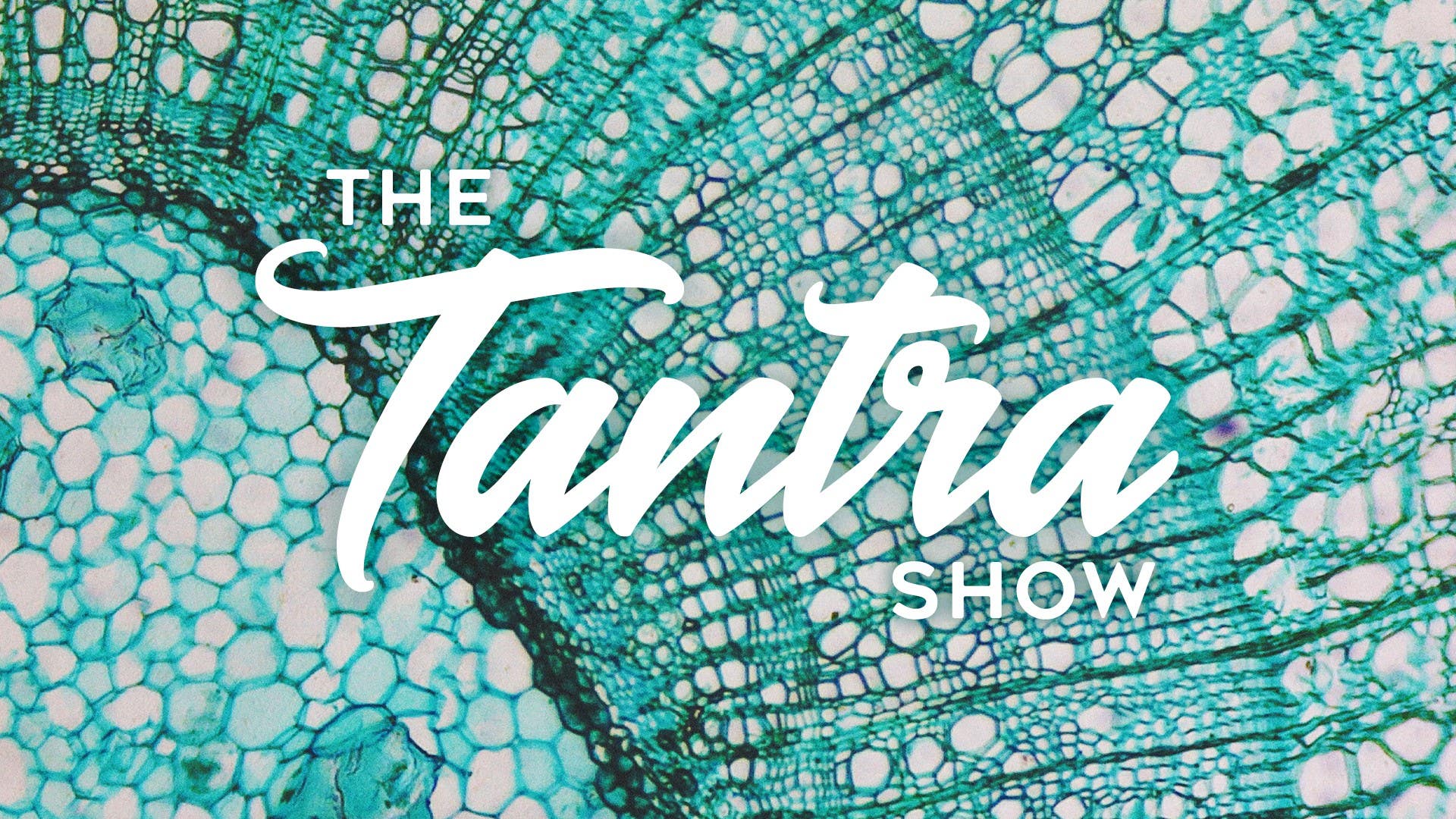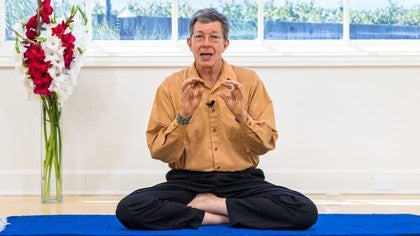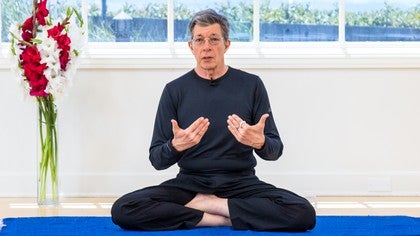Description
About This Video
Transcript
Read Full Transcript
One of the things that has exercised the imagination of intelligent human individuals over many, many millennia is the question of how can we actually ever know anything and know that we know something? If we take the supreme reality as being the only thing that is actually real and true, then certainly the more we are aligned with the supreme reality, aligned with divinity, the better able we will be both to align ourselves with what is real and true and to be able to determine in any particular context what is relatively more real than something that is relatively less real. This has always been important, this is even more important in the era of alternative facts that we have entered into now. Traditional classical Indian wisdom looks always for different methods of pramana, the word for pramana or rather the word pramana can be translated into English as truth or rather proof. It comes from the same root as the word manas which means the mind, it comes from the same root as the word maya and the root itself means to measure.
So pramana is a way of measuring whatever it is that you are trying to evaluate and measuring it not with a foot rule but rather measuring it from the perspective of to what degree is it an accurate representation of reality. Different systems of knowledge in classical India had different numbers and types of pramana since I was trained in Ayurveda chiefly I tend to appreciate the four pramanas that Ayurveda has respected since at least the past 2000 years and those four are number one personal experience. Using something yourself and having that experience feel real to you is very often not always but very often something that is an accurate perception. How to make it more accurate we will consider in just a few moments. So the word pratyaksha in Sanskrit literally means in front of the eye.
So when you have a vision of something when you can actually see how something is that is regarded as being the best kind of proof and it reflects in my opinion again just how important vision is to us as a sense to us humans. So the best way to be convinced of something is to experience it yourself. Another way often regarded as being the second best way is inference in Sanskrit that is anumana and inference is for example wherever there is smoke there is fire. It's not the other way around we can often have fire without smoke but if we see smoke we know that that smoke is coming from fire because nothing else that we know of produces smoke we can there may be things that look like smoke but if it is actual smoke it must be coming from some kind of fire. So when we can establish a relationship like that even if we can't see the thing that is actually what we are trying to see if we see something that is always associated with it then we can be confident that even if we can't perceive this other thing that it is actually there.
The third variety of evaluation of whether something is correct or incorrect real or unreal the third variety of proof is upamana which means analogy saying that something is like this and because we know that we know that that other thing that it is like is real then we can believe that this is real. In Ayurveda this is extended for example to how we explain the method by which the dhatus the tissues that make up the organism how those dhatus are nourished and so we can say one of the ways for example in which they are nourished is we can say that in the same way that crops in a field are nourished when you take water and you put the water and you let the water run in the furrows between the crops the water will go into the roots and nourish them that way so we can say that similarly one of the ways in which the tissues are nourished is for the blood to be circulating around through the tissues like water in a field and for the blood to go and nourish the tissues. How exactly the tissues are being nourished by the blood we may not know but we are able to identify the fact that as we can see that when we water plants properly they will grow when there is a good quality blood circulating in the organism we can see that the tissues are going to grow be properly nourished and be happy and healthy. The fourth method of proof is called aptopadesha or aptavakya and that means the testimony of an expert someone we have faith in someone whose word we have been able to rely upon if that person says that something is true then that is very likely to be the case. But that is not quite as strong as being able to identify by analogy which is not quite as strong as to be able to identify via inference which is not quite as strong as being able to see directly.
So when we have a direct experience of being well aligned with the divine this is the best way for us to understand that in fact we are well aligned with the divine. When we have rather more indirect experiences either somebody assuring us that we are headed in the right direction or knowing that if this is happening that very likely in fact our alignment is good or that these are more indirect ways but we do want to be able somehow or another to test whether what we are doing for the purpose of our own personal evolution is something that is giving us some results. How to test this is something that is going to require us to develop a certain sensitivity within us because that sensitivity that is within us is the origin of that sensitivity of course is consciousness awareness but that awareness is being manifested through prana. And to the degree that prana is able to circulate freely to the degree that we are able to accumulate prana in a healthy way and develop greater personal power that we hopefully are directing in that direction of personal evolution and not to either self aggrandizement or to causing trouble for others to that degree we will be able to be confident in the prana as our as the arbiter of our knowing whether we are headed in the right direction or not. To a certain degree this will require faith.
It's good to remember that there are two words, two chief words for faith in Sanskrit. One of them is Vishwasa. Vishwasa means breathing, Vishwasa means Vishasas, a special kind of breathing meaning that not just breathing with the lungs and the external air but faith is a kind of motion of the prana because prana must always be in motion but motion of the prana in such a way that creates a continuity between our awareness and the thing to which we are moving. So to say that we have faith that we are moving in the right direction means that we experience the effect of prana moving in the right direction and facilitating the movement of our awareness and our organism, our being in the right direction. The second word for faith is Shraddha which comes ultimately from the root Hrut which means the heart.
And the heart is the seat of the prana circulating in the body. So when you put your heart into something and when you can feel that something is resonating at the heart level you can be sure that it's resonating at the prana level. Now yes it is true that sometimes a person will have a resonance at the heart level that is not precisely accurate. Sometimes you can be led astray by your emotions in the same way that you can be led astray by your thoughts and your mentation. So it is particularly important to take advantage of that method of thinking and evaluation that has been employed by humans ever since the self-awareness developed and that is by employing the gut brain.
There is a nervous system that is substantially separate from the other nervous systems in the body that innervates the entire gut and it's separate from other parts of the body because the gut understands that it can't rely on how the emotions are working and it can't rely especially on what the head is doing. It has to be in charge of what's going on in its realm, in its domain if it is going to do its job which is digest everything in a positive way. And the reason why this is the basic fundamental way of thinking for a human being or any other animal is because if you want to stay alive you have to be able to know what to eat and what not to eat and you have to digest what you eat and get rid of what you shouldn't have eaten. So the gut has to be very, very clever and this is why it is so important. This is why Ayurveda lays such stress on having a diet that is appropriate for you and that diet especially nowadays there are certain things you have to be very careful to avoid and yes it is true that many people are gluten intolerant or at the very least terrified of being gluten intolerant but the main most important thing that you really want to avoid nowadays is sugar, S-U-G-A-R, a five letter word that might as well be a four letter word because really go into your cabinet and look at the ingredients on everything that is in that cabinet and you will find that there is sugar in almost everything and very often sugar is number one or number two.
On the list of what those ingredients are remember that those ingredients are listed in the order of the greatest amount in that product. So the first thing that you could do if you want to move in a good direction and be able to think more clearly and be able to perceive more accurately whether you are aligned with anything but particularly with the divine is to start reducing the amount of sugar that you take in because especially nowadays when people consume so much sugar has gone to, it is now at this stage of being a dire poison for the human being. So this is the beginning, the Ayurveda, plenty has been written, there is plenty of information out there and plenty of opportunities for you to experiment with the when you should eat and how you should eat and what you should eat, there is always trifala that will help you purify your organism. The main thing to do though is you want your gut to work as well as possible because then your gut brain will work well and when your gut brain works well then your intuition will work well. This is where the intuition comes from, it comes from the gut brain because the gut does not have fancy ways of thinking and the gut does not have dramatic and florid ways of feeling.
The gut is simply focused on what is real and what is unreal because for the gut life is very simple, stuff comes into it, it has to deal with it. It only wants to deal with stuff that it needs to deal with that is appropriate for the rest of the organism and is not going to cause a lot of trouble. It is very simple, the gut is not asking for much. What is of course very interesting is that especially nowadays people, the large number of people pay very little attention to what is going on in the gut. They spend a lot of attention thinking about what they would like to eat and what might be good and what other people are eating and how other people look when they are eating those things and how the things that we would like to eat are looking and all kinds of other complicated stuff which has very little to do with whether that is going to be well digested and if it is, whether it will be well assimilated and if it is, whether it will be well utilized.
So make things simple. Life is very complex nowadays. We have to combat complexity with simplicity. Especially in your food, food should be simple. It should be eaten in a little bit less than your ability to digest or your desire for food at any one time that makes sure or more sure that your digestive fire is going to remain strong.
And the better that you can get your digestive fire re-enkindled, the easier it is going to be for you to progressively transform that digestive fire into spiritual fire, to go from Jatra Agni to Mahabhuta Agni to more refined fire and it is that fire that enables you to perform Vivek discernment, to be able to determine whether something is in fact accurate or inaccurate, real or relatively unreal. So preferably speaking, we are always going to want to use, if at all possible, the head and the heart and the Hara point to test whether we are well aligned or not. We should be able to use the rational mind to determine whether or not we are pointed towards the Divine. We should be able to use our emotions to feel that we are connected to the Divine. But intuitively, we should take those two pieces of input and we should use the gut, the intuition to determine the degree to which we are in fact pointed in an appropriate groove towards that reality.
Inevitably there are going to be moments when we are more aligned and relatively less aligned. Inevitably there are going to be times when we are going to be a little bit more dilated and a little bit more contracted. This is completely normal and this is another interesting thing and another interesting reason why we want the gut to be very well aligned and that of course has to do with the vagaries of the vagus nerve. A nerve that has come into much more prominence over the past few years with the progressive interest being employed or directed towards polyvagal theory and the awareness of the importance of heart rate variability. It's very normal for there to be a variance in your heart rate between the inhalation and the exhalation and that variance should be fairly regular.
We should have regular irregularity rather than irregular irregularity or regular regularity. It should be irregular because that is what the heart should be doing. The heart should be working more when it has some oxygen coming in that it needs to send out to the rest of the tissues and it should be having a little tiny bit of a rest when it doesn't need to be doing that. So this is completely normal and it's more likely to be happening when an individual has a healthy relationship between the head and the body. The vagus nerve is one of those things that creates a connection between the head and the gut and the heart and it's connecting all parts of this together.
In this world in which we're living nowadays, in which people are living, very many people are living as if they were heads that were disconnected from their bodies, it's not surprising that many, many people lack appropriate variability in their heart rate. You can find this out for yourself. There are now apps you can get on your phone that can test for you whether your heart rate is varying appropriately or not. So we want the variance, but we want the variance to be relatively regular. We want it to be the heart rate to be increasing it when it needs to and decreasing when it needs to, but we want that to be in balance.
So we want the heart rate to be regular, but we don't want it to be regular in such a way that it has no variation whatsoever. That's abnormal. We want it to be varying regularly, just like the rest of you. During the day, you're going to expand. You're going to be more open.
You're going to take more things in. During the night, you're going to contract. You're going to be less open. You're going to take less things in. You're going to digest during the night what you took in during the day, both in your gut, in the form of actual digestion, and in your head, in the form of dreams.
So this is a natural process of the organism, and the better we are aligned in our organisms, the easier it's going to be, not only for us to be aligned with the divine, but also for us to be able to perceive our alignment with the divine. If you have any question about this, you can again go back to the pancho, pachata, puja, this offering of these five elements, whether you're doing it literally with five elements in the physical world, or whether you're doing it symbolically by visualizing. What you can do is you can take each one of those elements, and as you offer it, you can ask yourself the degree to which you can feel an alignment between that thing you're offering and that element you are offering it to. If there is a good alignment, you will be able to feel that alignment. If there's not such a good alignment, then perhaps it will feel a little opaque, or maybe it will feel dense, or maybe it will feel like you can't quite get a handle on it.
Somehow or another, you will be able to relate to yourself what exactly is going on that is preventing a healthy alignment there. So if you work with each one of the five elements, you may discover that four of the elements are just fine, but one of them, for example, the fire element. Maybe there's something that's not quite right. Then maybe that day you do a little extra pratika, or you build a fire and you spend some time with the fire, or you do something else that works with that element to encourage it and you to come into a better alignment again. Or maybe it's the earth element, in which case you spend more time in your garden, or you take a walk on a mountain, or something like that.
Or maybe it's the water element, in which case you pay closer attention to what you're eating and closer attention to what's going on with your emotions. If it's the air element, maybe you do something to encourage the prana to be properly aligned. And a good thing to do for that, of course, is nadi shodhana, or nadi shuddhi, purification of the nineties. Breathe in through the left, breathe out through the right. Breathe in through the right, breathe out through the left.
Initially don't hold your breath in between and keep the inhale and the exhale equal. Eventually you may find that what happens is that your breath will, not that you are actively stopping it, but that at that turnaround point your breath prefers to not move for a few seconds, and then it will return in the opposite direction. You may find that sometimes the exhalation becomes longer than the inhalation if you do. This is very often a beneficial pattern to establish. But what you will want to do is allow the breath to decide, at least initially, how it wants to move, and you facilitate how the breath is moving.
But you want to, because you're trying to keep a balance among all of these different things that you're trying to balance, the better balanced you are, the easier it's going to be for you to align with the divine. So starting the day by simply doing some nadi shodhi, 5 minutes, 10 minutes, 15 minutes, in the bed before you start to do anything else, you're just aligning yourself before you get up and start to move. This is a very simple and easy thing to do that can give you good benefit. If that's not useful to you, or if you find that you get better results by doing it at a different time, do it at a different time. But somehow or another, awareness of the movement of the prana in your body is going to benefit you because the movement from the perspective of your organism, prana is the divine.
It is coming from the outside, it is invigorating, it is providing consciousness and awareness. Prana is the personal deity of each of the cells in the body. So circulating the prana well, making sure that there is clarity in the organism as so far as possible, testing whatever it is that you want to test with the heart, with the head, with the heart and with the gut, and having faith that even if you can't always be clear that clarity will occur, is a good way to assist you to move in the direction of alignment with the divine.
The Tantra Show
Comments
You need to be a subscriber to post a comment.
Please Log In or Create an Account to start your free trial.












